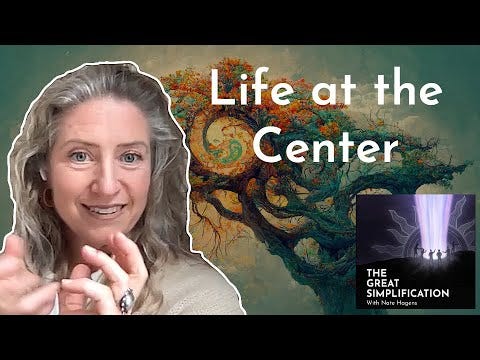Today, I’m joined by thought leader and ceremonial guide Samantha Sweetwater to share her journey through mysticism and guiding others through their own unique spiritual paths. Strengthening relationality is a critical component for fostering deeper connections to nature - including fellow humans - and subsequently creating more cooperative, peaceful societies. Within a culture which predominantly values linear processes, Samantha’s work has centered around finding a balance between convergent thinking and the relational intelligence we’ve neglected.
Samantha Sweetwater is a writer, soul mentor, strategic partner and deeply loved ceremonial guide. She has facilitated transformational experiences in diverse communities, cultures and industries on five continents for over 30 years. Her work bridges spirituality, science, psychedelics, indigenous wisdom, transpersonal psychology, embodiment and deep ecology. She leads experiences and conversations about our relationship with the earth, spirituality and systemic change that transform the way we think about what it means to be human.
Samantha is the founder and director of One Life Circle, a plant medicine ministry tending our intimacy with and belonging to Life. She also advises companies and organizations in the areas of technology, health, materials economy and psychedelics. As the former founder of Dancing Freedom and Peacebody Japan, she pioneered the conscious dance movement—facilitating tens of thousands of people and training hundreds of facilitators to seed communities around the globe. She holds an MA in Wisdom Studies and a BA in Social Theory and the Dance with a minor in Legal Philosophy. She has been initiated by indigenous teachers in Africa, South America and the US.
Her first book, True Human: Reimagining Ourselves at the End of Our World, will be available Fall Equinox 2024.
What can we learn from the various indigenous cultures who understand their entanglement with the land? Is it possible for future societies to value a more balanced development across the spiritual, mental, emotional, and physical aspects of its people? How can we - as individuals - nurture the subjective, intersubjective, and objective within ourselves to create more holistic sensemaking within a complex world?
In case you missed it…
In last week’s Frankly, I offered insights on my personal/organizational priorities as a lead up to outlining 7 global interventions that I see as being most impactful in preparing for a resource constrained future. As global stability deteriorates and the various macro-crises converge, how we invest our time and resources now can have a big impact for the various scenarios coming our way. What would healthy humans surrounded by community and a shared purpose, informed by the ecological systems synthesis be able to accomplish?
If you appreciate The Great Simplification podcast…
Be sure to leave a review on your preferred podcast platform! Leaving reviews helps the podcast grow, which helps spread awareness of our systemic situation from experts in ecology, energy, policy, economics, technology, and community building so that we can better understand - and respond to - the challenges of the coming decade.
The Great Simplification podcast is produced by The Institute for the Study of Energy and Our Future (ISEOF), a 501(c)(3) organization. We want to keep all content completely free to view globally and without ads. If you’d like to support ISEOF and it’s content via donation, please use the link below.






Excellent stimulating discussion with Samantha Sweetwater! Her discussion of the research from the Berkeley Center for the Greater Good prompted me to think that in current geopolitics Putin, Xi, Orban, Israel and Hamas don’t promote or even politically permit holding a multiplicity of views while the US and its Allies have over the years built institutions that promote a multiplicity of views and, thus, general have been able to promote relatively more peaceful societies.
Also was very encouraged about her skillful inclusion of Iain McGilchrist’s description of how the dominance of left brain thinking contributes significantly to the current lack of the emphasis on holding a multiplicity of views.
Really enjoyed this, until my phone died in the gym (can't figure out whether that's a jarring or apt location for such a discussion). Interesting to listen to a kind of 'poly spiritual' perspective so open to different ways of framing these issues. Samantha's wariness of maps notwithstanding, I'm interested to see how this all feeds into your work mapping out the Great Simplification.